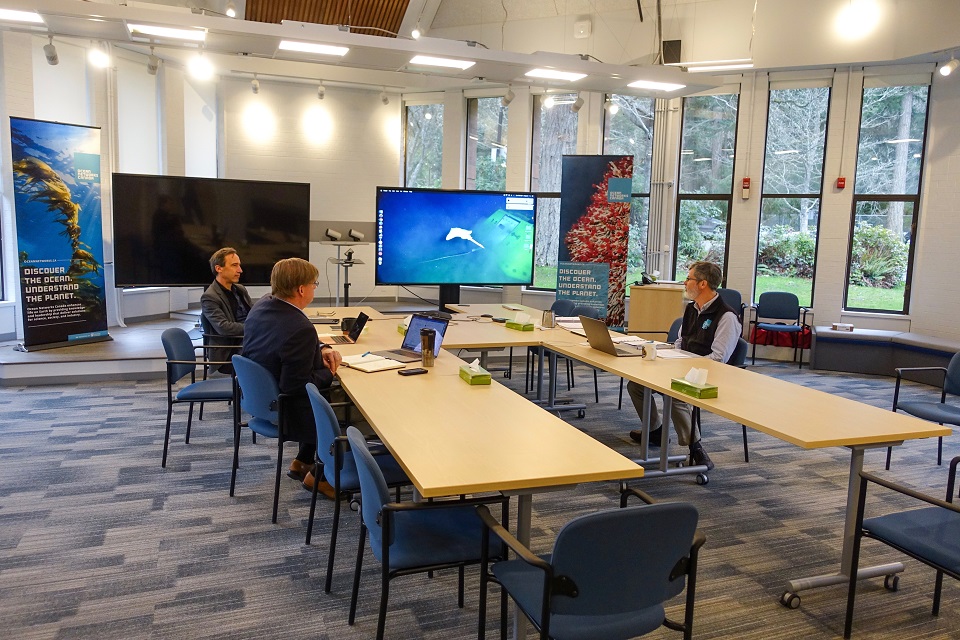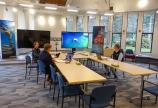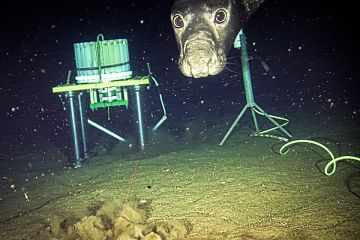UVic expands oceans, climate research with new campus location

World-leading ocean and climate researchers at the University of Victoria have a new centre where they will continue producing the critical knowledge used by communities, governments and industry for sustainable ocean management and to mitigate and adapt to climate change.
The $9.5 million Ocean-Climate Building at Queenswood establishes a new research and technology site within walking distance of the UVic campus.
At today’s official opening, the Government of Canada announced $12.6 million over four years for Ocean Networks Canada (ONC), the anchor group in the building. The investment under Canada’s Ocean Protections Plan (OPP) supports ONC’s work to monitor ocean health and factors which affect endangered orcas, and to expand its ability to provide real-time data on ocean surface currents, better informing navigation and emergency response.
“The University of Victoria is pleased to partner with the Government of Canada in the protection of our country’s oceans. ONC’s sensors and data management system positions Canada as a unique international leader in ocean observing and technology. These systems collect and share essential data products that is critical for improving marine safety, understanding the impacts of ship noise, and monitoring critical ocean habitats,” says UVic President Jamie Cassels.
“The Government of Canada has had a long and productive relationship with the University of Victoria and Ocean Networks Canada. Canada’s investments, including those announced today, will help further our work with the University of Victoria and ONC to better support measures implemented through the Oceans Protection Plan and improve safety in Canadian waters. These investments will also help us better understand our oceans and improve our efforts to protect their health and sustainability, while also aiding efforts to address the effects of climate change and protect aquatic species for our kids and grandkids,” says Jonathan Wilkinson, minister of Fisheries, Oceans and the Canadian Coast Guard.
The new science and technology location at Queenswood is a former residential care facility that was significantly renovated and reconfigured with $3.5 million from the Government of Canada’s Post-Secondary Institutions Strategic Investment Fund, $850,000 from the Province of BC and $5.15 million from UVic. The university bought the six-hectare site and buildings from the Sisters of St. Ann in 2010.
“The new Ocean-Climate Building is preparing for 21st-century careers in a diverse, strong, sustainable 21st-century economy,” says Melanie Mark, minister of Advanced Education, Skills and Training. “By working together, students, researchers and businesses, along with Indigenous nations play a vital role in protecting our environment. Research produced at UVic will improve our quality of life, help BC rise to the challenge of climate change and support our plan for a better, cleaner future.”
Upgrades to the nearly 30,000-square-foot facility includes new fibre optic networks, a flexible interior wall system to create large, collaborative workspaces for interdisciplinary work as well as individual offices, configured to serve specific needs, and extensive seismic upgrades. It is currently home to over 200 researchers, co-op students, scientists and staff.
ONC, which moved to the premises in July, has operations in all three of Canada’s oceans, including its recent collaboration with associate member, the Marine Institute of Memorial University of Newfoundland. The partnership includes ONC ingesting meteorological, ocean current and wave data from seven buoy deployments in the Atlantic Ocean. Real-time data from the buoys is available to mariners, fishers, industry and government decision-makers via ONC’s Oceans 2.0 data management/archive system.
“The Ocean-Climate Building at Queenswood provides Ocean Networks Canada with new headquarters for its world-leading ocean sensor and data enterprise that delivers ‘ocean intelligence’ across science, society and industry—from coastal community observing to national partnerships to international deep-sea research,” says Kate Moran, ONC president and CEO.
Queenswood also has been chosen as the sole international site for the World Data System International Technology Office, a new initiative to coordinate the management of global research data.
The new UVic complex provides physical space for collaborations among UVic’s climate and ocean researchers.
Ocean and climate research happens across UVic in labs, schools, departments, centres and institutes—in biology, geography, earth and ocean sciences, environmental studies, biochemistry, business, law, history, and electrical, computer, mechanical and civil engineering. These diverse areas of study underline the interconnectedness of Earth’s systems, from the minuscule phytoplankton that capture carbon from the atmosphere, to harnessing the ocean waves that may one day power our cities.
UVic hosts three research and knowledge-sharing institutes focused exclusively on ocean and climate: ONC, Pacific Climate Impacts Consortium and the Institute for Integrated Energy Systems. A fourth centre, the UVic-hosted and -led Pacific Institute for Climate Solutions is a collaboration with BC’s three other research-intensive universities that studies the impacts of climate change and develops positive approaches to mitigation and adaptation.
In addition, UVic is home to two Environment Canada labs—the Canadian Centre for Climate Modelling and Analysis, a flagship, internationally recognized climate modelling laboratory, and the Water and Climate Impacts Research Centre, specializing in hydro-climatology and the hydrologic and ecological impacts of atmospheric change and variability.
A media kit containing high-resolution photos is available on Dropbox.
Government of Canada release
Province of British Columbia release
-- 30 --
Photos
Media contacts
Greig Bethel (Ocean Networks Canada media relations) at 250-216-7510 (cell) or gbethel@uvic.ca
Denise Helm (University Communications + Marketing) at 250-721-7656 or dhelm@uvic.ca
In this story
Keywords: research, oceans, climate, Ocean Networks Canada, environment, science, government, environment, sustainability, administrative
People: Jamie Cassels





